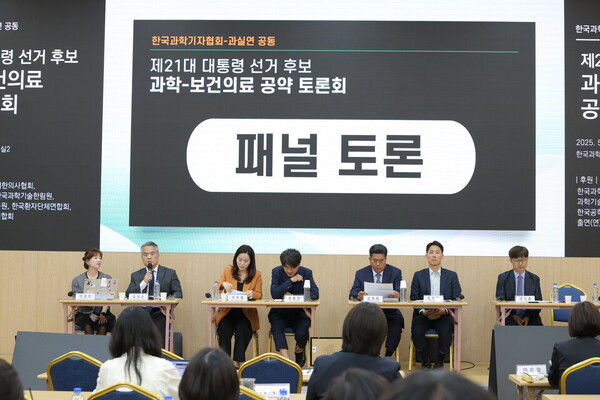Democratic Party of Korea (DPK) presidential candidate Lee Jae-myung proposed establishing public medical schools to address regional and essential healthcare needs.
However, the medical community criticized the plan as vague and questioned its effectiveness.
“Terms like ‘public medical school’ and ‘public medical academy’ are used interchangeably, but what’s the difference?” asked Professor Kim Sung-geun of the Catholic University of Korea and spokesperson for the Korean Medical Association (KMA), during a healthcare policy debate on Wednesday. “It will take 10 years to train new doctors. How does that solve today’s healthcare problems?”

The debate, co-hosted by the Korea Science Journalists Association and the National Coalition for the Realization of a Sound Science and Technology Society, highlighted conflicting views on key health issues among major presidential contenders.
Kim noted that the medical community resists adding more schools, not just students. “We already have 40 medical colleges. It's hard enough to find professors and research support in rural schools. Yet the DPK suggests building another one in the provinces.”
In response, Kang Cheong-hee, a member of the DPK’s healthcare committee, said the public medical school proposal stemmed from the closure of Seonam Medical University and the available student quota. She added that the proposed “public medical academy” would offer students state-supported training and require service afterward, similar to military cadets.
Candidates diverge on resolving government-doctor standoff
Presidential candidates also had differing views on how to resolve the ongoing conflict between the government and the medical community, particularly the return of medical students and junior doctors.
Rep. Lee Ju-young of the New Reform Party (NRP) said, “We are not offering carrots or special treatment. The right policies are the way to bring medical professionals back.”
DPK’s Kang said that “resolving the government-doctor conflict could be a condition for medical students and trainee doctors to return.
“Whether or not to return to work is up to the junior doctors themselves as professionals. However, they should return while they still have the opportunity to resolve the conflict structure with each other,” Kang said. “We need to recognize why they left the medical field. We plan to take the initiative to address this as soon as the new government takes office.”
“I think the best way to prevent further disruption is for medical students to return to school and for trainee doctors to return to hospitals as soon as possible now that they have reflected their opinions on the government’s policy. We are also studying various options,” Kang added.
Funding healthcare: focus on curbing overuse
When asked how they would fund health insurance to support campaign promises, candidates agreed on the need to curb overtreatment and misuse of resources.
“Instead of increasing premiums, we must prevent waste and abuse,” said Kang. “That includes cracking down on excessive billing by certain hospitals.”
Kim Sun-jung, head of the Healthy Health and Welfare Division of the Policy and General Headquarters of the People Power Party (PPP), said, “The rational use of health insurance finances is something everyone agrees on in principle. We spend about 10 percent of GDP on ordinary medical expenses, the OECD average and 130 trillion won ($94 billion) on total medical expenses. We believe it is time to examine whether we can lower medical expenditures through rational and proactive healthcare utilization.”
“It's time to think more about how to lower the rising costs, not how to cover them,” Kim said. “The lifetime medical expenses of a person are over 100 million won due to the aging population and the increase in lifespan due to advances in medical technology. The National Health Wallet, a PPP pledge, will enable rational medical care use.”
NRP’s Lee said, “Currently, 700 billion won is saved by curbing excessive medical care,” adding that it can be used to strengthen essential medical infrastructure.
“I don't think raising the entire health insurance premium is reasonable. If it goes up further, pensions will also go up, reducing the disposable income that individuals can spend,” Lee said. “It's better to have the government cover the minimum medical care by paying a modest amount of medical expenses, rather than paying a huge amount of medical expenses and enjoying modest medical care within it, and then having the autonomy to cover other needs.”
Related articles
- Health ministry urges military to cut service term for public health, army doctors
- [Contribution] New government, same old healthcare problems?
- 'Frontrunner Lee Jae-myung's public med school plan may spark social conflict'
- Some patients are ‘dying while waiting’ as Korea’s liver transplant system falls into crisis
- Public healthcare still failing rural areas after decades, doctors warn
- KMA urges expert involvement in presidential candidates’ healthcare pledges
- Presidential candidates: Who will rewrite Korea's healthcare playbook?
- Doctors' group urges new government to prioritize restoring trust
- DPK: Yoon’s healthcare reforms to be scrutinized, not scrapped
- Health ministry revisits public medical school plan from scratch
- Debate heats up over Lee’s campaign pledge to establish a public medical school

